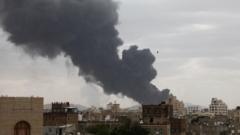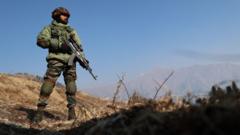India and Pakistan's historical conflict intensifies as mutual accusations of aggression lead to military actions.
**Escalation of India-Pakistan Conflict: Air Strikes Reported Amid Rising Tensions**

**Escalation of India-Pakistan Conflict: Air Strikes Reported Amid Rising Tensions**
Explosions in Pakistani Kashmir signal increased hostilities after a deadly terrorist attack in India.
Explosions reverberated through Pakistan-administered Kashmir early Wednesday, as local residents reported hearing jets overhead and blasts near the city of Muzaffarabad. These incidents follow India’s declaration of significant retaliation after a recent terrorist attack that claimed the lives of over two dozen civilians in the Indian-administered region of Kashmir. The assault, which took place on April 22, involved militants targeting a group of tourists, marking one of the gravest attacks on Indian civilians in years.
In the aftermath, Indian officials swiftly attributed responsibility to Pakistan, arguing that the neighboring nation likely played a role in orchestrating the violence, a claim that the Pakistani government has vehemently denied, asserting no involvement. Despite India's lack of substantial evidence backing its allegations, the Indian government has announced a series of punitive actions against Pakistan, threatening potential disruptions to water supplies from a critical river system.
In response to the attack, Indian forces executed widespread arrests within Kashmir to apprehend those responsible, while instances of small-scale exchanges of gunfire between Indian and Pakistani troops have been reported along the border. The recent explosions, however, amplify the conflict to a perilous level, raising concerns that this could escalate into a larger, uncontrollable war. Pakistan has pledged to retaliate if provoked further, and both nations remain armed with nuclear capabilities, heightening fears of catastrophic consequences.
The situation underscores an urgent need for de-escalation and dialogue, as continuing hostilities pose significant risks not only to the immediate region but also to global security.
In the aftermath, Indian officials swiftly attributed responsibility to Pakistan, arguing that the neighboring nation likely played a role in orchestrating the violence, a claim that the Pakistani government has vehemently denied, asserting no involvement. Despite India's lack of substantial evidence backing its allegations, the Indian government has announced a series of punitive actions against Pakistan, threatening potential disruptions to water supplies from a critical river system.
In response to the attack, Indian forces executed widespread arrests within Kashmir to apprehend those responsible, while instances of small-scale exchanges of gunfire between Indian and Pakistani troops have been reported along the border. The recent explosions, however, amplify the conflict to a perilous level, raising concerns that this could escalate into a larger, uncontrollable war. Pakistan has pledged to retaliate if provoked further, and both nations remain armed with nuclear capabilities, heightening fears of catastrophic consequences.
The situation underscores an urgent need for de-escalation and dialogue, as continuing hostilities pose significant risks not only to the immediate region but also to global security.




















